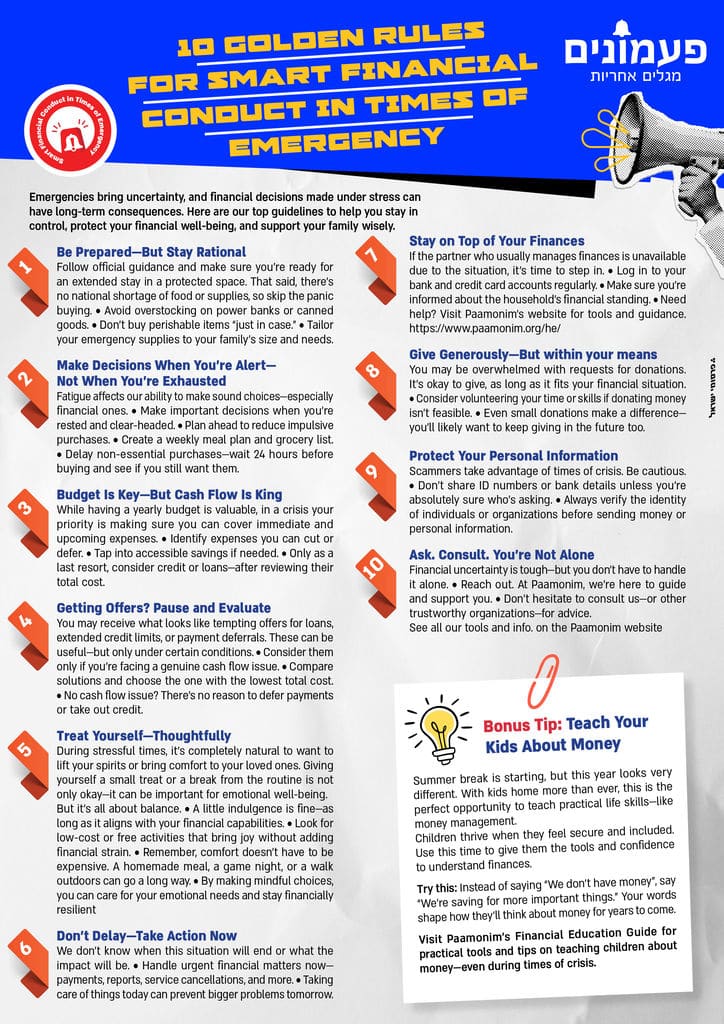Emergencies bring uncertainty, and financial decisions made under stress can have long-term consequences. Here are our top guidelines to help you stay in control, protect your financial well-being, and support your family wisely.
-
Be Prepared—But Stay Rational
Follow official guidance and make sure you’re ready for an extended stay in a protected space. That said, there’s no national shortage of food or supplies, so skip the panic buying.
* Avoid overstocking on power banks or canned goods.
* Don’t buy perishable items “just in case.”
* Tailor your emergency supplies to your family’s size and needs.
-
Make Decisions When You’re Alert—Not When You’re Exhausted
Fatigue affects our ability to make sound choices—especially financial ones.
* Make important decisions when you’re rested and clear-headed.
* Plan ahead to reduce impulsive purchases.
* Create a weekly meal plan and grocery list.
* Delay non-essential purchases—wait 24 hours before buying and see if you still want them.
-
Budget Is Key—But Cash Flow Is King
While having a yearly budget is valuable, in a crisis your priority is making sure you can cover immediate and upcoming expenses.
* Identify expenses you can cut or defer.
* Tap into accessible savings if needed.
* Only as a last resort, consider credit or loans—after reviewing their total cost.
-
Getting Offers? Pause and Evaluate
You may receive what looks like tempting offers for loans, extended credit limits, or payment deferrals. These can be useful—but only under certain conditions.
* Consider them only if you’re facing a genuine cash flow issue.
* Compare solutions and choose the one with the lowest total cost.
* No cash flow issue? There’s no reason to defer payments or take out credit.
-
Treat Yourself—Thoughtfully
During stressful times, it’s completely natural to want to lift your spirits or bring comfort to your loved ones. Giving yourself a small treat or a break from the routine is not only okay—it can be important for emotional well-being.
But it’s all about balance.
- A little indulgence is fine—as long as it aligns with your financial capabilities.
- Look for low-cost or free activities that bring joy without adding financial strain.
- Remember, comfort doesn’t have to be expensive. A homemade meal, a game night, or a walk outdoors can go a long way.
By making mindful choices, you can care for your emotional needs and stay financially resilient
-
Don’t Delay—Take Action Now
We don’t know when this situation will end or what the impact will be.
* Handle urgent financial matters now—payments, reports, service cancellations, and more.
* Taking care of things today can prevent bigger problems tomorrow.
-
Stay on Top of Your Finances
If the partner who usually manages finances is unavailable due to the situation, it’s time to step in.
* Log in to your bank and credit card accounts regularly.
* Make sure you’re informed about the household’s financial standing.
* Need help? Visit Paamonim’s website for tools and guidance. https://www.paamonim.org/he/
-
Give Generously—But within your means
You may be overwhelmed with requests for donations. It’s okay to give, as long as it fits your financial situation.
* Consider volunteering your time or skills if donating money isn’t feasible.
* Even small donations make a difference—you’ll likely want to keep giving in the future too.
-
Protect Your Personal Information
Scammers take advantage of times of crisis. Be cautious.
* Don’t share ID numbers or bank details unless you’re absolutely sure who’s asking.
* Always verify the identity of individuals or organizations before sending money or personal information.
-
Ask. Consult. You’re Not Alone
Financial uncertainty is tough—but you don’t have to handle it alone.
* Reach out. At Paamonim, we’re here to guide and support you.
* Don’t hesitate to consult us—or other trustworthy organizations—for advice.
To contact us- click here
See all our tools and info. on the Paamonim website
💡 A Bonus Tip: Teach Your Kids About Money
Summer break is starting, but this year looks very different. With kids home more than ever, this is the perfect opportunity to teach practical life skills—like money management.
Children thrive when they feel secure and included. Use this time to give them the tools and confidence to understand finances.
Try this: Instead of saying “We don’t have money”, say “We’re saving for more important things.”
Your words shape how they’ll think about money for years to come.
👉 Visit Paamonim’s Financial Education Guide for practical tools and tips on teaching children about money—even during times of crisis.




